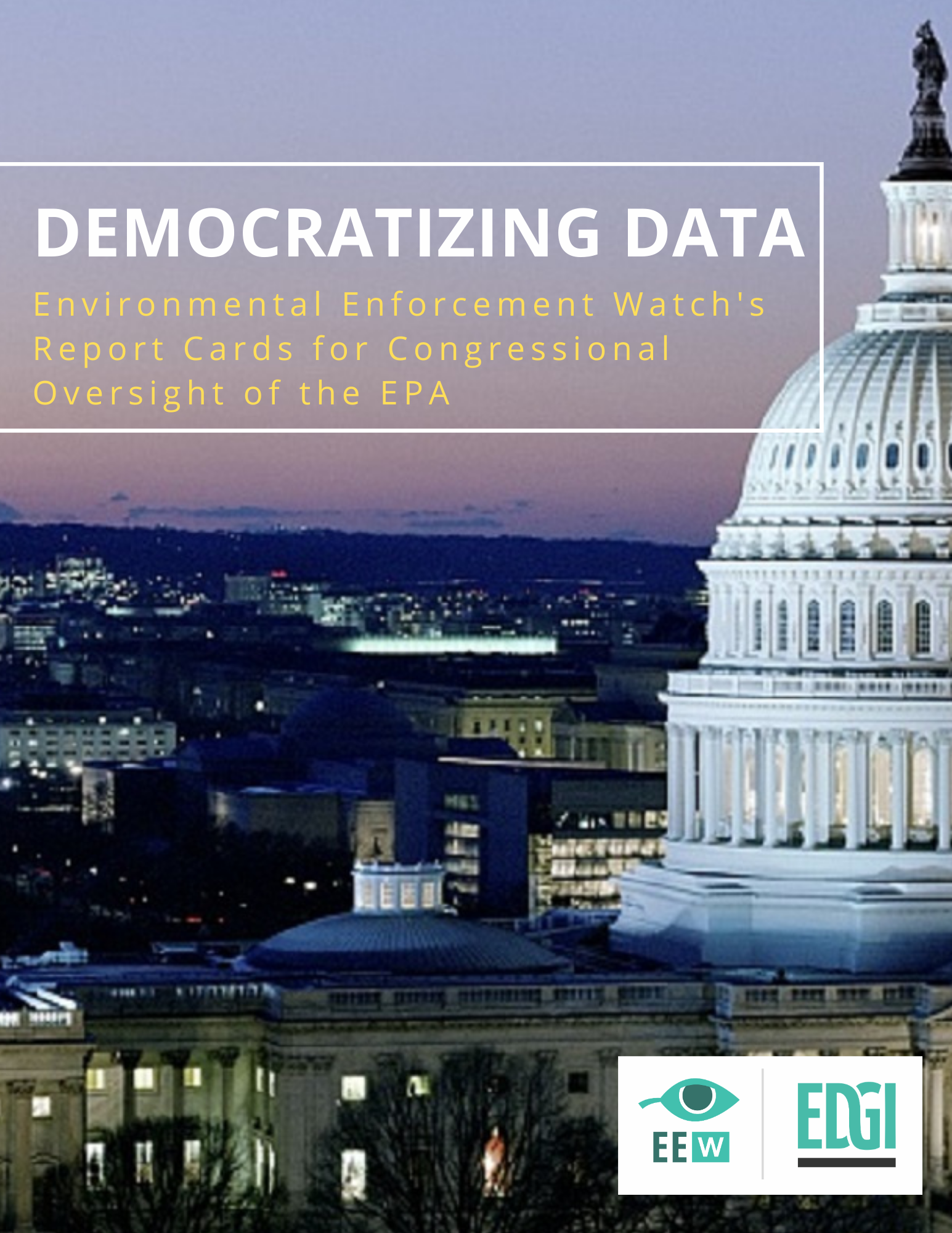New Reports Analyze Compliance and Enforcement Under Trump’s EPA
CONTACT: Report authors are available for interview. To set up media interviews or for other inquiries, please contact Shannan Lenke Stoll, ShannanStoll.edgi@gmail.com.
FOR IMMEDIATE RELEASE:
Seventy-six congressional report cards released by Environmental Data & Governance Initiative’s Environmental Enforcement Watch on October 22, 2020, show a decline in compliance and enforcement for key U.S. environmental laws under the Trump administration. The report cards are summarized in the new report, Democratizing Data: Environmental Enforcement Watch’s Report Cards for Congressional Oversight of the EPA, which provides for the first time an analysis of Environmental Protection Agency data on compliance and enforcement in the districts and states of the representatives and senators serving on the two congressional committees tasked with overseeing the Environmental Protection Agency.
All the data used in the report cards and summary report are drawn from publicly available data in EPA’s Enforcement and Compliance History Online database. The Congressional Report Cards were produced using an open source data analysis tool created by EDGI. The project focuses on three of the most important environmental laws in the United States: the Clean Air Act , the Clean Water Act, and the Resource Conservation and Recovery Act.
EDGI’s summary report analyzing data across the 76 congressional districts and states shows:
- Violations of the Clean Water Act during the Trump administration increased in almost all the states and congressional districts analyzed.
- Inspection rates during the Trump administration fell in most of the states and congressional districts analyzed.
- Enforcement actions during the Trump administration declined in most of the states and congressional districts analyzed, and penalties have fallen almost universally.
- In 2019, violations of the Clean Water Act evidence a crisis in regulatory compliance.
- These patterns occurred consistently in Democratic and Republican congressional districts and states.
“The numbers we present are some of the best available evidence of what is actually happening with environmental enforcement locally and regionally. Our data are drawn from districts and states representing 36% of the U.S. population. And what our analysis suggests is that there is a crisis with compliance and enforcement in these regions—those are areas where millions of Americans live. This needs to be addressed.”
—Leif Fredrickson, Democratizing Data report lead author, Environmental Data & Governance Initiative Policy Analyst
“Black, Latinx, Indigenous, and low-income communities—among other historically marginalized groups—face disproportionate exposure to hazardous waste sites and polluting industries. These industries have undue influence in the writing and development of regulations, leading to standards that are not health-protective. Even still, many industrial facilities fail to even comply with these insufficient regulations. The financial penalties for doing so represent just a small fraction of their profits in the unlikely case that these penalties are enforced at all. This crisis of non-compliance, coupled with already-inadequate regulations, represents a systematic and deliberate choice to ignore environmental and human health. It has become ever clearer that we need good enforcement data in order to hold industry accountable. We want clean air, clean water, and an end to environmental racism and injustice. Strong environmental regulation is important, but it’s only as good as its enforcement.”
—Monica Unseld, Democratizing Data report author, member of Environmental Data & Governance Initiative, founder of Data for Justice
Reports and other project outcomes are now available on EDGI’s Environmental Enforcement Watch website. Outcomes include:
- 76 customized report cards of each House Energy and Commerce Committee representative’s district and each Environment and Public Works Committee senator’s state
- A summary report of key findings across all districts and states.
- A 2-page project brief that reviews key findings.
- The open source data analysis tool used to create the reports cards.
###
The Environmental Data & Governance Initiative (EDGI) analyzes federal environmental data, websites, institutions, and policy. We seek to improve environmental data stewardship and to promote environmental health and environmental justice.
Environmental Enforcement Watch (EEW) is a collaborative project of EDGI that seeks to bring people together from different backgrounds to analyze and engage with the data from the Environmental Protection Agency’s Enforcement and Compliance History Online database.

